Gary Gauthier's Blog, page 5
November 24, 2012
The Fates We Have Ordained
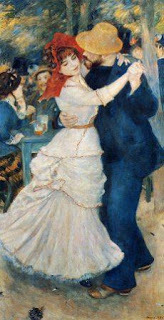 I have often noticed that we are inclined to endow our friends with the stability of type that literary characters acquire in the reader's mind. No matter how many times we reopen "King Lear," never shall we find the good king banging his tankard in high revelry, all woes forgotten, at a jolly reunion with all three daughters and their lapdogs. . . .
I have often noticed that we are inclined to endow our friends with the stability of type that literary characters acquire in the reader's mind. No matter how many times we reopen "King Lear," never shall we find the good king banging his tankard in high revelry, all woes forgotten, at a jolly reunion with all three daughters and their lapdogs. . . .Whatever revolution this or that popular character has gone through between the book covers, his fate is fixed in our minds, and, similarly, we expect our friends to follow this or that logical and conventional pattern we have fixed for them.
Thus X will never compose the immortal music that would clash with the second-rate symphonies he has accustomed us to. Y will never commit murder. Under no circumstances can Z ever betray us. We have it all arranged in our minds, and the less often we see a particular person the more satisfying it is to check how obediently he conforms to our notion of him every time we hear of him. Any deviation in the fates we have ordained would strike us as not only anomalous but unethical.
Vladimir Nabokov, Lolita
Painting: Pierre Auguste Renoir, Dance at Bougival
Published on November 24, 2012 13:54
November 21, 2012
This Autumn Be Thankful
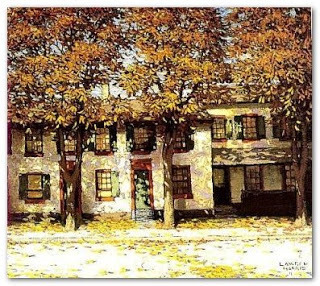 Any one whose labors take him into the far reaches of the country, as ours lately have done, is bound to mark how the years have made the land grow fruitful.
Any one whose labors take him into the far reaches of the country, as ours lately have done, is bound to mark how the years have made the land grow fruitful.This is indeed a big country, a rich country, in a way no array of figures can measure and so in a way past belief of those who have not seen it. Even those who journey through its Northeastern complex, into the Southern lands, across the central plains and to its Western slopes can only glimpse a measure of the bounty of America.
And a traveler cannot but be struck on his journey by the thought that this country, one day, can be even greater. America, though many know it not, is one of the great underdeveloped countries of the world; what it reaches for exceeds by far what it has grasped.
So the visitor returns thankful for much of what he has seen, and, in spite of everything, an optimist about what his country might be. Yet the visitor, if he is to make an honest report, must also note the air of unease that hangs everywhere.
For the traveler, as travelers have been always, is as much questioned as questioning. And for all the abundance he sees, he finds the questions put to him ask where men may repair for succor from the troubles that beset them. . . .
But we can all remind ourselves that the richness of this country was not born in the resources of the earth, though they be plentiful, but in the men that took its measure. For that reminder is everywhere—in the cities, towns, farms, roads, factories, homes, hospitals, schools that spread everywhere over that wilderness.
We can remind ourselves that for all our social discord we yet remain the longest enduring society of free men governing themselves without benefit of kings or dictators. Being so, we are the marvel and the mystery of the world, for that enduring liberty is no less a blessing than the abundance of the earth.
And we might remind ourselves also, that if those men setting out from Delftshaven had been daunted by the troubles they saw around them, then we could not this autumn be thankful for a fair land.
Wall Street Journal, Editorial (1961)
Painting: Lawren S. Harris
Published on November 21, 2012 04:45
November 17, 2012
The Best of All Invisible Things
 To the King.
To the King.Sir, I do here most humbly lay this small present at your Majesties royal feet. And though it comes accompanied with two disadvantages, the meanness of the author and of the subject; yet in both I am encouraged by the greatness of your Mercy and your Knowledge.
By the one I am taught that you can forgive the most presumptuous offenders; and by the other, that you will not esteem the least work of Nature, or Art, unworthy of your observation.
Amidst the many felicities that have accompanied your Majesty’s happy Restoration and Government, it is none of the least considerable that Philosophy and Experimental Learning have prospered under your Royal Patronage. And as the calm prosperity of your Reign has given us the leisure to follow these studies of quiet and retirement, so it is just, that the fruits of them should, by way of acknowledgement, be returned to your Majesty.
There are Sir, several other of your subjects, of your Royal Society, now busy about nobler matters: the improvement of manufactures and agriculture, the increase of commerce, the advantage of navigation: in all which they are assisted by your Majesty’s encouragement and example.
Amidst all those greater designs, I here presume to bring in that which is more proportionable to the smallness of my abilities, and to offer some of the least of all visible things, to that Mighty King, that has established an Empire of the best of all invisible things of this world, the minds of men.
— Robert Hooke; Dedication to Micographia: Some Physiologicial Descriptions of Minute Bodies made by Magnifying Glasses With Observations and Inquiries Thereupon; 1667
Illustration: Ant, from Micrographia
Published on November 17, 2012 11:43
All The Power of Their Souls
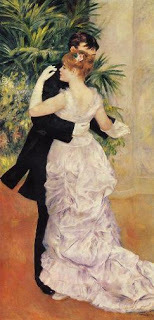 Most fearful they are to contemplate, the expenses of this entertainment. They will certainly be over two hundred dollars and maybe three hundred; and three hundred dollars is more than the year's income of many a person in this room.
Most fearful they are to contemplate, the expenses of this entertainment. They will certainly be over two hundred dollars and maybe three hundred; and three hundred dollars is more than the year's income of many a person in this room. . . . And then to spend such a sum, all in a single day of your life, at a wedding feast! (For obviously it is the same thing, whether you spend it at once for your own wedding, or in a long time, at the weddings of all your friends.)
It is very imprudent, it is tragic—but, ah, it is so beautiful! Bit by bit these poor people have given up everything else; but to this they cling with all the power of their souls—they cannot give up the veselija! To do that would mean, not merely to be defeated, but to acknowledge defeat—and the difference between these two things is what keeps the world going.
The veselija has come down to them from a far-off time; and the meaning of it was that one might dwell within the cave and gaze upon shadows, provided only that once in his lifetime he could break his chains, and feel his wings, and behold the sun; provided that once in his lifetime he might testify to the fact that life, with all its cares and its terrors, is no such great thing after all, but merely a bubble upon the surface of a river, a thing that one may toss about and play with as a juggler tosses his golden balls, a thing that one may quaff, like a goblet of rare red wine.
Thus having known himself for the master of things, a man could go back to his toil and live upon the memory all his days.
— Upton Sinclair, The Jungle
Painting: Pierre Auguste Renoir (1841-1919)
Published on November 17, 2012 11:42
October 1, 2012
The Art of Reading
A Personal Account of an Ongoing Relationship With WordsI've always been fond of dictionaries for as long as I can remember. As a teenager, one Christmas, I asked a relative for a dictionary as my holiday present. It was a Webster’s Collegiate Dictionary, an edition in hard cover with red cloth.
Words have a life and a history, and just as with people their best attributes can be hidden in nuance. Writers, whose stock-in-trade is words, recognize the importance of giving words their full due. The best writers can make reading a satisfying, delightful and an almost delicious experience, all because of words.

The high school I attended assigned Victorian Era books like Oliver Twist. This was thrown in among other more readable books or what I then considered more “normal” fare. At the time, Hawthorne's The Scarlet Letter seemed to me like an excellent choice to kill a young person’s interest in reading and literature.
Some years ago, at a cocktail party, I ran into someone who, as it turned out, was a high school English teacher. Our conversation led me to wonder out loud the point of assigning The Scarlet Letter to teenagers who don’t have the vocabulary to understand, let alone, appreciate the work. Her reply was something to the effect that the students understood the issues raised by the book and showed great interest in discussing them.
I simply nodded in agreement and left the conversation there. When I was in high school, it was only because of the book’s Monarch Notes, I was able to pick up—nothing distinct mind you, just—faint hints and clues as to what the book was about and the important questions it supposedly addressed.
I’ve now read The Scarlet Letter three times and I’ve formed a deep appreciation for its literary merit. I am also more convinced than ever that assigning it to the average high school freshman class is a disservice to the students.
At some point in college, I decided I wouldn’t let a single word pass me by if I didn’t have a ready definition for it on the tip of my tongue. This is a different standard than having a vague idea what a word means. For a period of what may have been two years, I carried a Little Oxford English Dictionary with me everywhere I went. It had a hard cover and was smaller than an average paperback. It contained the great majority of the words I looked up.
I was looking up words all the time. It’s a wonder I ever finished reading anything. Eventually, looking up so many words must have had some positive effect because I stopped relying on my Little Oxford. It was sometime after this, I had occasion to visit one of my university professors in his office. I was working on a paper and we needed to discuss its progress.
As I remember now, years later, it was a decent-sized office. The only other thing I remember about it is that in the office, up on a stand—or maybe it was an improvised lectern—sat a huge unabridged dictionary. It is the kind of dictionary you only see in the reference section of libraries, always opened somewhere in the middle as if a book like that isn’t meant to remain closed. It is the kind of book that has perhaps a four inch spine and if you had to venture a guess, you might say it easily weighs between 15 and 20 pounds.
Later on, after leaving the professor’s office—and the impression of the over-sized dictionary having settled in—I remember thinking to myself, “So this is how the pros do it.”
I have never owned an unabridged dictionary but I can certainly appreciate its value. I have never lost my fondness for words and their meaning. The habit of constantly looking up words still haunts me and to this day it slows me down when I read.
Ereaders have brought the art of reading to the information age. Today, the definition of 99 percent of all words is only one touch away when we read. You don’t need to lug around a Little Oxford and the Oxford English Dictionary is no longer published in printed editions.
Painting: Henri Matisse (1869 – 1954)
Do you have a special relationship to books, words and reading?
Words have a life and a history, and just as with people their best attributes can be hidden in nuance. Writers, whose stock-in-trade is words, recognize the importance of giving words their full due. The best writers can make reading a satisfying, delightful and an almost delicious experience, all because of words.

The high school I attended assigned Victorian Era books like Oliver Twist. This was thrown in among other more readable books or what I then considered more “normal” fare. At the time, Hawthorne's The Scarlet Letter seemed to me like an excellent choice to kill a young person’s interest in reading and literature.
Some years ago, at a cocktail party, I ran into someone who, as it turned out, was a high school English teacher. Our conversation led me to wonder out loud the point of assigning The Scarlet Letter to teenagers who don’t have the vocabulary to understand, let alone, appreciate the work. Her reply was something to the effect that the students understood the issues raised by the book and showed great interest in discussing them.
I simply nodded in agreement and left the conversation there. When I was in high school, it was only because of the book’s Monarch Notes, I was able to pick up—nothing distinct mind you, just—faint hints and clues as to what the book was about and the important questions it supposedly addressed.
I’ve now read The Scarlet Letter three times and I’ve formed a deep appreciation for its literary merit. I am also more convinced than ever that assigning it to the average high school freshman class is a disservice to the students.
At some point in college, I decided I wouldn’t let a single word pass me by if I didn’t have a ready definition for it on the tip of my tongue. This is a different standard than having a vague idea what a word means. For a period of what may have been two years, I carried a Little Oxford English Dictionary with me everywhere I went. It had a hard cover and was smaller than an average paperback. It contained the great majority of the words I looked up.
I was looking up words all the time. It’s a wonder I ever finished reading anything. Eventually, looking up so many words must have had some positive effect because I stopped relying on my Little Oxford. It was sometime after this, I had occasion to visit one of my university professors in his office. I was working on a paper and we needed to discuss its progress.
As I remember now, years later, it was a decent-sized office. The only other thing I remember about it is that in the office, up on a stand—or maybe it was an improvised lectern—sat a huge unabridged dictionary. It is the kind of dictionary you only see in the reference section of libraries, always opened somewhere in the middle as if a book like that isn’t meant to remain closed. It is the kind of book that has perhaps a four inch spine and if you had to venture a guess, you might say it easily weighs between 15 and 20 pounds.
Later on, after leaving the professor’s office—and the impression of the over-sized dictionary having settled in—I remember thinking to myself, “So this is how the pros do it.”
I have never owned an unabridged dictionary but I can certainly appreciate its value. I have never lost my fondness for words and their meaning. The habit of constantly looking up words still haunts me and to this day it slows me down when I read.
Ereaders have brought the art of reading to the information age. Today, the definition of 99 percent of all words is only one touch away when we read. You don’t need to lug around a Little Oxford and the Oxford English Dictionary is no longer published in printed editions.
Painting: Henri Matisse (1869 – 1954)
Do you have a special relationship to books, words and reading?
Published on October 01, 2012 14:23
September 27, 2012
Spiritual Bankruptcy
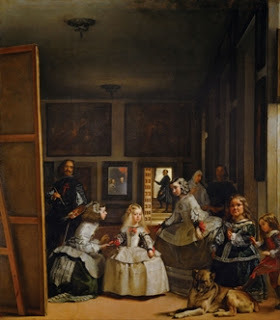 Who knew what the real truth was? No one. That's who. In the sweet sounding world of Sugardale nothing was ever what it seemed, and no one was ever who they pretended to be, including me.
Who knew what the real truth was? No one. That's who. In the sweet sounding world of Sugardale nothing was ever what it seemed, and no one was ever who they pretended to be, including me.Life in Sugardale reminded me of the house of mirrors I visited whenever the fair came to town. There was a different mirror for each kind of person you wanted to be. If you wanted to be skinny or fat, short or tall, round-faced or long-chinned, all you had to do was look in the right mirror.
That's what we did everyday of our lives—Frank, Momma and me. Across the threshold of our front door stood an invisible mirror. Every morning, we lined up in front of it and decided who we needed to be that day—dutiful wife, loving stepdaughter, family man, hard working, church going, pillars of the community. Once we determined what our role for the day should be, we stepped through the mirror and voila! We became that person. At the end of the day, we simply stepped back through the mirror of make-believe and reverted into our real selves.
But the mirror demanded all who used its life-transforming magic pay a fee. Every day, when we stepped back through the mirror, we were required to leave behind a small piece of ourselves, a token of integrity or sliver of truth that we no longer had a right to claim. How long could such payments continue before spiritual bankruptcy occurred? Who knew? Not me.
Deborah Epperson, Breaking Twig
Painting: Diego Velázquez, Las Meninas, The Maids of Honor (1656)
Published on September 27, 2012 09:55
September 25, 2012
The Most Colorful Life Imaginable
Date a girl who reads. Date a girl who spends her money on books instead of clothes. She has problems with closet space because she has too many books. Date a girl who has a list of books she wants to read, who has had a library card since she was twelve.
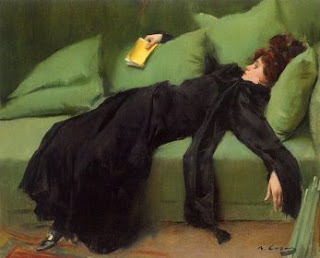
If you find a girl who reads, keep her close. When you find her up at 2 AM clutching a book to her chest and weeping, make her a cup of tea and hold her. You may lose her for a couple of hours but she will always come back to you. She’ll talk as if the characters in the book are real, because for a while, they always are.
Date a girl who reads because you deserve it. You deserve a girl who can give you the most colorful life imaginable. If you want the world and the worlds beyond it, date a girl who reads.
Or better yet, date a girl who writes.
Rosemarie Urquico,
Painting: Ramón Casas y Carbó (1866 – 1932)

If you find a girl who reads, keep her close. When you find her up at 2 AM clutching a book to her chest and weeping, make her a cup of tea and hold her. You may lose her for a couple of hours but she will always come back to you. She’ll talk as if the characters in the book are real, because for a while, they always are.
Date a girl who reads because you deserve it. You deserve a girl who can give you the most colorful life imaginable. If you want the world and the worlds beyond it, date a girl who reads.
Or better yet, date a girl who writes.
Rosemarie Urquico,
Painting: Ramón Casas y Carbó (1866 – 1932)
Published on September 25, 2012 14:24
September 23, 2012
Spurious Tripe
 Another thing that is being largely counterfeited is tripe. Parties who buy tripe cannot be too careful. There is a manufactory that can make tripe so natural that no person on earth can detect the deception.
Another thing that is being largely counterfeited is tripe. Parties who buy tripe cannot be too careful. There is a manufactory that can make tripe so natural that no person on earth can detect the deception. They take a large sheet of rubber about a sixteenth of an inch thick for a background, and by a process only known to themselves veneer it with a Turkish towel, and put it in brine to soak. The unsuspecting boarding house keeper, or restaurant man buys it and cooks it, and the boarder or transient guest calls for tripe. A piece is cut off the damnable tripe with a pair of shears used in a tin shop for cutting sheet iron, and it is handed to the victim. He tries to cut it, and fails; he tries to gnaw it off, and if he succeeds in getting a mouthful, that settles him. He leaves his tripe on his plate, and it is gathered up and sewed on the original piece, and is kept for another banquet.
George W. Peck, Peck's Compendium of Fun
Painting: Johannes Vermeer, Girl with a Wine Glass
Spurious: adj. 1) False or fake, 2) Apparently but not actually valid
Tripe: n. 1) Nonsense, rubbish 2) The first or second stomach of a cow or other ruminant used as food.
Published on September 23, 2012 07:16
September 17, 2012
The Value of the Little Things in Life
Remembrance of Things Past
Sometimes, an old photograph, a familiar scent or a tune you hear can trigger a flood of memories and associations. This past weekend, I read an article titled The Morning Routines of Successful People and it set in motion a train of memories.

Meaningful Coincidences and Lasting Memories
The article reminded me of a friend I knew in college and the perfume she wore. She wore Halston; back then it was all the rage. It reminded me of the book she recommended to me, Emily Bronte's Wuthering Heights.
In an opening scene, a visitor, enjoying the warmth of a fireplace, is captivated by a story told by the housekeeper, Nelly Dean. At one point Nelly stops and draws attention to the lateness of the hour and suggests that the story could be wrapped up in “half a dozen words.” Lockwood, the visitor says he’d prefer it if she continues at a leisurely pace because he intends to sleep until ten the next day. Nelly Dean’s memorable reply is:
As an aside, we were both pre-med students at the time. I never made it to medical school. My friend went on to become the head of radiation oncology at a hospital.
Morning Routines - On a mundane level, a ritual is a routine that we follow or a set of actions we perform out of habit. A ritual allows you to lose yourself in a process, thus freeing your mind. It can facilitate a type of free-form meditation that promotes silence and clear thinking. It can put you in a zone that is conducive to productivity and peak performance.
The choices for creating a ritual that suits your lifestyle and temperament are almost boundless. Your ritual can be as effortless as sitting alone and relishing the aroma and flavors of a steaming cup of your favorite blend. Depending on the mood of the present moment and what circumstances may require, you can collect scattered thoughts, savor the moment or consider your plans for the day ahead.
The most interesting point I drew from the article is that willpower is like a muscle. It can get tired and its store of energy can be depleted during the course of a day. After a good night’s rest, you have as much willpower as you are going to have at any other time. There was no word on whether the more you use it, the stronger it gets.
See: The Morning Routines of Successful People
Are you a morning person? Do you have a morning routine?
Painting: Frank Desch (1873 – 1934)
Sometimes, an old photograph, a familiar scent or a tune you hear can trigger a flood of memories and associations. This past weekend, I read an article titled The Morning Routines of Successful People and it set in motion a train of memories.

Meaningful Coincidences and Lasting Memories
The article reminded me of a friend I knew in college and the perfume she wore. She wore Halston; back then it was all the rage. It reminded me of the book she recommended to me, Emily Bronte's Wuthering Heights.
In an opening scene, a visitor, enjoying the warmth of a fireplace, is captivated by a story told by the housekeeper, Nelly Dean. At one point Nelly stops and draws attention to the lateness of the hour and suggests that the story could be wrapped up in “half a dozen words.” Lockwood, the visitor says he’d prefer it if she continues at a leisurely pace because he intends to sleep until ten the next day. Nelly Dean’s memorable reply is:
You shouldn't lie till ten. There's the very prime of the morning gone long before that time. A person who has not done one-half his day's work by ten o'clock runs a chance of leaving the other half undone.I don’t know why, but the last sentence stayed with me and I never forgot it. I picked up the book during a college semester on a lark, as it wasn’t part of my coursework. It was assigned to my then-ex-girlfriend for her English class and I read it based on her recommendation. I’m sure there are lots of other things I learned that semester, but I couldn’t tell you what they were and it’s as though I’ve forgotten them all.
As an aside, we were both pre-med students at the time. I never made it to medical school. My friend went on to become the head of radiation oncology at a hospital.
Morning Routines - On a mundane level, a ritual is a routine that we follow or a set of actions we perform out of habit. A ritual allows you to lose yourself in a process, thus freeing your mind. It can facilitate a type of free-form meditation that promotes silence and clear thinking. It can put you in a zone that is conducive to productivity and peak performance.
The choices for creating a ritual that suits your lifestyle and temperament are almost boundless. Your ritual can be as effortless as sitting alone and relishing the aroma and flavors of a steaming cup of your favorite blend. Depending on the mood of the present moment and what circumstances may require, you can collect scattered thoughts, savor the moment or consider your plans for the day ahead.
The most interesting point I drew from the article is that willpower is like a muscle. It can get tired and its store of energy can be depleted during the course of a day. After a good night’s rest, you have as much willpower as you are going to have at any other time. There was no word on whether the more you use it, the stronger it gets.
See: The Morning Routines of Successful People
Are you a morning person? Do you have a morning routine?
Painting: Frank Desch (1873 – 1934)
Published on September 17, 2012 13:32
Your Natural Voice as a Writer

John James Adubon
Clues From How the Caged Bird Sings
A long time ago, I met a young woman and in our first conversation, it came out that she sang with a choir. I told her I couldn't sing, and I confided that I would love to be able to do it. I never forgot her reply.
—Chances are you can sing, first you have to find your range.
Every Writer Has a Voice. Your voice, as a writer, is the style that makes your writing unique. It is the language you use and how you make your point. It's what your readers hear and how it makes them feel.
Discover Your Voice. Just as you have a natural speaking voice, you have a writing voice that belongs only to you. It is shaped by your personality, beliefs and interests.
What you read has a great influence on your writing voice. The genres and authors you enjoy the most are a good indication of the direction where your voice lies. Use your reading to discover, explore and develop your voice.
Become familiar with your voice to put yourself in the best position for training.
Train Your Voice. Writers train by writing. Consider each piece of writing you create as a training exercise. The more you write, the more adept you will become at controlling your voice and the more comfortable you will become using it.
Aim to master your writing voice like a musician masters an instrument.
Your Voice Has a Range. At times, you will have to modify your writing style to suit a particular task. A romance novel, an article for Seventeen Magazine and a query letter each requires a different tone of voice.
Certain types of writing will be outside your range. Your comfort zone and your range are closely aligned. You can expand your range with training and passion.
Outside Influences Can Play a Role. A writer's voice can also be shaped by his social environment and life experiences. Charles Dickens and Thomas Hardy both wrote in Victorian-era England and their writings show it.
Mark Twain wrote about life in the United States and it's no wonder that his voice is very different from that of Charles Dickens even though both use humor and satire in their writings.
Embrace Your Voice. Your voice is an asset. Once you have an idea of where your voice lies, embrace it. Celebrate it. Run with it. Write with style. Your voice is your style.
We are all blessed with a distinctive voice. Even if you model your writing after another's, it will come out in your own voice.
Don't Be Afraid of the Audience.
Forget your generalized audience. In the first place, the nameless, faceless audience will scare you to death and in the second place, unlike the theater, it doesn’t exist. In writing, your audience is one single reader. I have found that sometimes it helps to pick out one person—a real person you know, or an imagined person and write to that one.
— John Steinbeck
Be Yourself. It's a lot easier to be who you are if you're comfortable in your own skin. Allow your writing to give voice to your inspirations. Be authentic.
Put Your Heart Into It. Give every piece you create your best effort. You'd notice if your favorite author, or favorite poet, made a halfhearted effort. The wellspring of great writing is an authentic voice that speaks with passion.
Have you found your voice? Who influenced you?
Published on September 17, 2012 13:32



